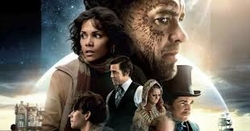

Walkey Talk: Pretentious Mess Or Artful Masterpiece?
Filed under: Walkey Talk
The most ambitious movie of the year opened two weeks ago to box office indifference. Millions of movie goers passed up the postmodern opus Cloud Atlas, in favour of more conventional fare like Argo, Wreck-It Ralph, and Flight. The auditoriums were empty, but critics couldn't stop talking about it. Ever wonder how bizarro movies like Cloud Atlas gets critics gushing all over them while audiences virtually ignore them outright?
Because we're all elitist film snobs and the general public just doesn't understand these movies? That's one theory that's not entirely false, but not exactly the whole picture either.
A movie that strays from formula is often perceived as striving for something more than just to make a buck. This admiration is how critics end up liking movies like Cloud Atlas.
"If you're not going to break new ground, then what's the point?" – James Cameron
Whether you're a professional film critic or just an average movie goer, the more movies you see over your lifetime, the more critical you will become. Your tastes will grow and evolve over time naturally, but also your ability to pick out clichés and formulas increases after seeing so many ideas recycled. So it's only natural for critics to fall in love with a film like Cloud Atlas and gush over its perceived originality. When asked in an interview what's the one thing he wishes he saw more of in movies, the late Gene Siskel once replied, "Something I've never seen before."
When something comes along with the audacity of a Cloud Atlas, critics often admire the film even if they don't think it's entirely successful as a complete film. But since it reaches for something almost unobtainable, it's able to score some brownie points. It's like an Olympic gymnast doing a routine with a higher difficulty rating. Cloud Atlas' ambition level is a perfect 10. So even if it fails it's still a solid 8. On the other hand, no matter how perfectly executed a Kevin James comedy is, the level of ambition is no more than a 6 at best.
Do I really have to explain the plot of this movie? Here's a very basic summary: Cloud Atlas consists of six interrelated and interwoven stories that take the viewer from the South Pacific in the nineteenth century to a distant, post-apocalyptic future. At times, I found the film to be an exhilarating experience to watch. Other times it was difficult for me to follow. The stories are not told in chronological order and switch back and forth at an impatient pace leaving this viewer occasionally frustrated.
Yet, I'm still thinking about this movie a week after I saw it. I'm still not entirely sure if I liked it or not, but the fact that it's still very vivid in my memory speaks volumes about its impact. I forgot about Taken 2 by the time I was hit the parking lot.
People often ask me: Why would filmmakers choose to tell a story in this way? Why not structure your narrative in a linear fashion? The answer is simple.
Because they can.
Cloud Atlas's kaleidoscope narrative structure represents the unlimited potential of film. Editing is the very essence of film and without it, it just as well be radio.
The movie is a lot to take in, but the ambitious scope alone in Cloud Atlas is an achievement.

However is ambition enough? Ambition may be enough to admire something but admiring a film is not the same as liking it. Any form of creative expression would be considered art. But films, (specifically American film) is a mainstream art form, therefore the question of entertainment will always come up.
For any artist, the word "entertainment" is a dirty word. The same could be said for elitist film snobs like me. But don't forget, the most basic definition of "entertainment" is really just holding the viewer's attention. Once you lose the viewer's interest, everything is lost. It doesn't matter how original or revolutionary your art is if no one cares. Entertainment is the vehicle to which the artist's message is carried to the viewer. Without it, you have nothing.
So where does that leave Cloud Atlas? How entertaining is it? Well, I have to admit I was never bored by the film but I was also never as emotionally involved in it as I was something like say, Argo, an excellent film, albeit a less ambitious one than Cloud Atlas. Does that mean Argo is a better movie? Perhaps, but that's not exactly the point. The point is, sometimes a failure is more interesting than a success. Interesting doesn't necessarily mean bad and entertaining doesn't necessarily mean good. Confused?
Let me put it this way:
Argo is the more entertaining movie, but Cloud Atlas is the more interesting one.
Which one is better? I think that's obvious.
Tags: Argo, Cloud Atlas, Walkey Talk
Related Posts
- Oscar Talk: Straight Outta Contention
- Walkey Talk: It's Not Binary. Films Can Be Popular AND Ambitious
- Oscar Talk: The Curious Case of Creed for Best Picture
- Walkey Talk: The Day the Future Stood Still
- Oscar Talk: Importance vs. Influential





Comments Posted (